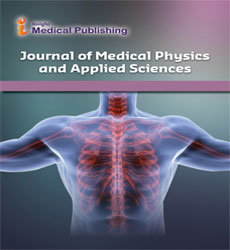The Role of Health Physicists
Amrutha M
Amrutha M*
Department of Chemical Engineering, Andhra University, Andhra Pradesh, India
- *Corresponding Author:
- Amrutha M
Department of Chemical Engineering
Andhra University, Andhra Pradesh, India
E-mail: amrutha _m@gmail.com
Received Date: March 05, 2021; Accepted Date: March 22, 2021; Published Date: March 29, 2021
Citation: Amrutha M (2021) The Role of Health Physicists. Insights Med Phys Vol.6 No.2:e007.
Editorial Note
Health physicists work in a variety of disciplines, including research, industry, education, environmental protection, and enforcement of government regulations. Although the health physicist usually concentrates in one of these disciplines, a professional health physicist typically performs duties in several areas.
In research, health physicists investigate principles by which radiation interacts with matter and living systems. Health physicists also study environmental levels of radioactivity and the effects of radiation on biological systems on earth and in space. This information is used in many ways, ranging from designing radiation detection instrumentation to establishing radiation protection stealth physicists work in a variety of disciplines, including research, industry, education, environmental protection, and enforcement of government regulations. Although the health physicist usually concentrates in one of these disciplines, a professional health physicist typically performs duties in several areas.
In research, health physicists investigate principles by which radiation interacts with matter and living systems. Health physicists also study environmental levels of radioactivity and the effects of radiation on biological systems on earth and in space. This information is used in many ways, ranging from designing radiation detection instrumentation to establishing radiation protection standards.
Industrial or applied health physicists draw upon their technical knowledge and varied experience to advise and make recommendations to management regarding methods and equipment for use in radiation work. The health physicist also assists engineers and scientists in designing facilities and new radiation control programs. As the primary consultant during any radiation emergency, a health physicist commonly has total control of the involved area.
Health physicists working in education develop and instruct training programs for future health physicists. They also provide any necessary training for radiation workers and the general public. These individuals instruct workers and other health physicists on the level of risk associated with particular radiation sources and methods used to reduce risk. One goal is to help individuals understand the relative degree of risk of radiation exposure. In most cases, the risk is no greater than that found in other industries.
Health physicists who work in regulatory enforcement must have knowledge and experience concerning all types of radiation hazards in order to establish guidelines for adequate radiation control. These guidelines help society receive the greatest benefits from radiation sources at the lowest possible exposure.
The responsibilities of a medical health physicist are broad and ever challenging. These individuals work wherever radiation sources are used to diagnose and treat human diseases. Hospitals, clinics, and major medical centres use radiation sources, including x-ray machines, particle accelerators, lasers, and many types of radioactive materials. Medical health physicists are needed to ensure proper and safe working conditions for both patients and medical staff.
Medical health physicists find a variety of professional challenges as more applications in medicine develop each year. Radiology, nuclear medicine, and radiation therapy departments are found in almost every modern hospital today. Each of these departments utilizes radiation sources, and medical health physicists are employed to assure their safe use.
A medical health physicist often serves as the designated Radiation Safety Officer (RSO) for a medical facility. The RSO is responsible for performing radiation safety surveys of all radiation sources used within the facility; monitoring radiation exposure of workers, patients, and visitors to the facility; establishing and monitoring radiation safety procedures; and assuring the medical facility is in compliance with state and federal radiation safety regulations. The medical health physicist may evaluate and make recommendations regarding the potential hazards of nonionizing radiation such as microwaves and laser beams.
Because health physicists have responsible technical positions in several disciplines, you will need a broad background of education and experience. A basic education in the physical sciences is necessary, but training is also required in other areas.
Health physicists check radiation levels at a nuclear weapons test site. If you desire national recognition as a health physics professional, you may seek certification at either of two educational and experience levels. Certification may be obtained from the American Board of Health Physics (ABHP) and, for technicians, through the national registry of radiation protection technologists.
Open Access Journals
- Aquaculture & Veterinary Science
- Chemistry & Chemical Sciences
- Clinical Sciences
- Engineering
- General Science
- Genetics & Molecular Biology
- Health Care & Nursing
- Immunology & Microbiology
- Materials Science
- Mathematics & Physics
- Medical Sciences
- Neurology & Psychiatry
- Oncology & Cancer Science
- Pharmaceutical Sciences
